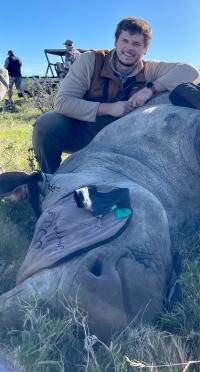
The survival of critically endangered Rhinoceros populations across Africa requires a multidisciplinary approach to mitigate disease threats, reduce poaching, increase breeding populations, and the preserve and expand wildland habitats. Our team from the UC Davis One Health Institute, the Conservation Landscape Institute, and the University of Pretoria, South Africa, are working to determine the prevalence and health impacts of Theileria bicornis & Babesia bicornis (blood-borne parasites) and other parasites and viruses in the Eastern Cape province of South Africa.
With funding from UC Davis Global Affairs, the School of Veterinary Medicine and the Karen C. Dryer Wildlife Health Center we are working to understand the impact of these diseases on rhinos to guide enhanced disease monitoring strategies and support ongoing large-scale efforts that seek to greatly expand wildlife corridors and wildlands in South Africa with the aim to conserve these magnificent animals

